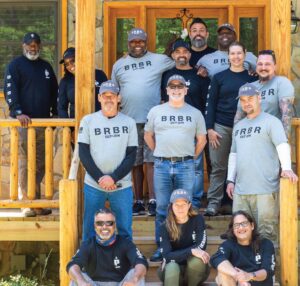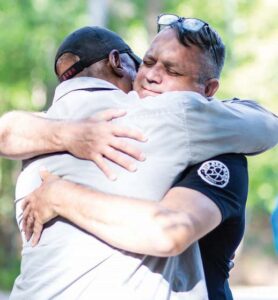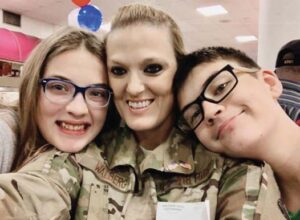
Warrior PATHH Class Alumni and BRBR Warrior PATHH Guides Photos courtesy of BRBR PATHH Guides and TM Instructor Donielle Freeberg
Posttraumatic Stress Disorder (PTSD) was added to the Diagnostic and Statistical Manual of Mental Disorders in 1980 by the American Psychiatric Association. The significant change ushered in by the PTSD concept was the stipulation that this issue’s cause was an event outside the individual rather than an inherent individual self-perception of weakness.
Until the addition of PTSD into the manual of Mental Disorders, all those dealing with Posttraumatic Stress, especially combat veterans and first responders, were encouraged to suck it up and drive on to overcome the trauma.
Ken Falke spent 21 years in the U.S. Navy Special Operations Explosive Ordnance Disposal (EOD) community and retired as a Master Chief Petty Officer. During the wars in Iraq and Afghanistan, hundreds of EOD warriors were injured and killed on the battlefields. Falke and his wife, Julia, visited many wounded EOD warriors and their families and felt they deserved more support and care than what was available to them.
The Falkes’ initial philanthropy eventually became Boulder Crest Foundation, an organization focused on the wellness teachings of Posttraumatic Growth. BCF was founded in 2010 in Bluemont, Virginia. Boulder Crest forged ahead developing a new approach to train combat veterans, first responders, and their families to transform their struggles to strength called Warrior PATHH (Progressive and Alternative Training for Helping Heroes).
Much of Boulder Crest’s philosophy came from the studies of Dr. Richard Tedeschi and Dr. Lawrence Calhoun. Most of this research and writing also focused on the concept of Posttraumatic Growth and how it helped heal. Tedeschi and Calhoun set up a laboratory to study how people change in positive ways as a result of the struggle with trauma and adversity in the early 1980s.
They coined the term Posttraumatic Growth in 1995. Dr. Tedeschi is considered the foremost authority in this area and his work was named in Stanford University’s list representing the top two percent of the world’s most-cited researchers.
In 2014, Sutton Shaw helped create The Big Red Barn Retreat to honor her late father, Leon Irons. The Big Red Barn Retreat is a non-profit company dedicated to helping veterans and first responders suffering from work or combat related stress issues thrive and create lives filled with joy, purpose, and connection.
Mitch Ray is the executive director of BRBR. He comes from a military family and moved to the Columbia area 25 years ago to start a sportswear business through Army Air Force Exchange Services.
“I met Sutton about ten years ago while Fundraising Chair for the Association of the United States Army and began to understand the mission. I was a founding board member for Serve and Connect so I got to know lots of the First Responders. I met Chris three different times when he was at Fort Jackson. Now I feel like my life has a passion and a purpose,” says Ray.
Chris is Lamont Christian, the torchbearer for Big Red Barn Retreat. He was born and raised in New York but eventually became part of a military family.
“My dad served in Vietnam,” says Christian. “After he got out he was attending medical school when he met my mom. He took us on, married my mother and I when I was a teenager and went back into the military. He started all over again as a paratrooper in the 82nd Airborne, packed us up, and moved to Fayetteville, North Carolina.”
Chris joined the military to pay for college and made a career of it. After several deployments and moves to bases all over the world, his last stop was Fort Jackson as the Commandant of The U.S. Army Drill Sergeant Academy and later serving as the Post Command Sergeant Major for Fort Jackson and all of Basic Combat Training for the Army.
After retiring in 2018, Chris reconnected with The Big Red Barn Retreat, after already having a relationship with Fort Jackson but in various limited ways. Shaw asked him to lead the program she wanted to bring to South Carolina.
At first Chris said no but she mentioned some things that “touched me. One of those was that it’s a Breakthrough Program focused on individual self-care. It helps people that might be struggling with leaving the military or life in general to redefine their purpose. Some people will say it changes your life but I will say it changes your perspective to allow you to live the life you’re supposed to live.”
Chris immediately took the training. It changed his life and helped to strengthen his family as the changes in the program spread through each member in a family who was struggling to deal with personal tragedy. Healing wasn’t immediate but it came.
Posttraumatic Growth, the core of Boulder Crest Foundation is the wellspring for the programs that Big Red Barn Retreat adheres to. Programs focus on transformative life changes. According to Dr. Richard Tedeschi, “It’s not just bouncing back, most people talk about that as resilience. We distinguish from resilience because Posttraumatic Growth is transformative.”
Programs focus on measured transformative life changes in five areas of growth—deeper relationships, new possibilities, appreciation for life, inner strength, and spiritual/existential change.
The five steps of PTG are Education, Regulation, Disclosure, Story, and Service. The foundation of these phases is centered around being able to create a sense of trust and connection for self and others. Programs are designed to step participants through the program, making personal changes as they go, and developing honest evaluation and trust with themselves first and family members as they progress.
Each session is critiqued and studied for any possible improvements for future classes. Veterans, active-duty military members, National Guard, Reserve, first responders, and their families are currently eligible. Plans are being made to possibly include other occupations that might be subject to similar stressful conditions.
While doing interviews for this story I mentioned that BRBR was monumental. Christian replied, “I like that you say it’s monumental. In this very room less than a week ago it was monumental watching individuals arriving skeptical, feeling closed off, shut in; I’ll deal with my own problems. By the end of the week they were saying this has really changed my life. People 40, 50 years old said this was the first time in my life I ever felt like I was seen. I was heard. I was valued.”
For more information about BRBR, visit thebigredbarnretreat.org.
For more examples, visit the BRBR YouTube channel, www.youtube.com/@thebigredbarnretreat1405.




Loading Comments